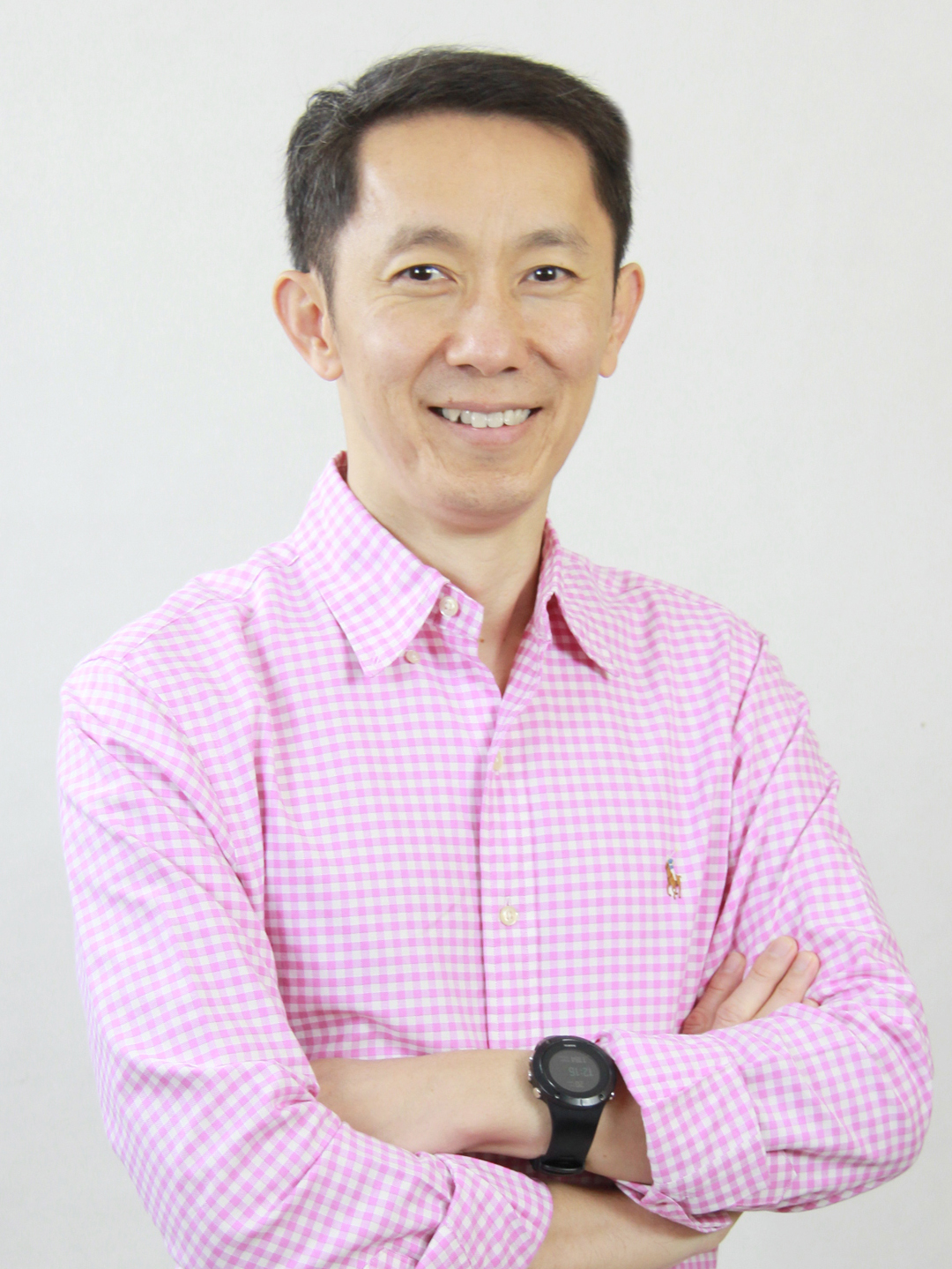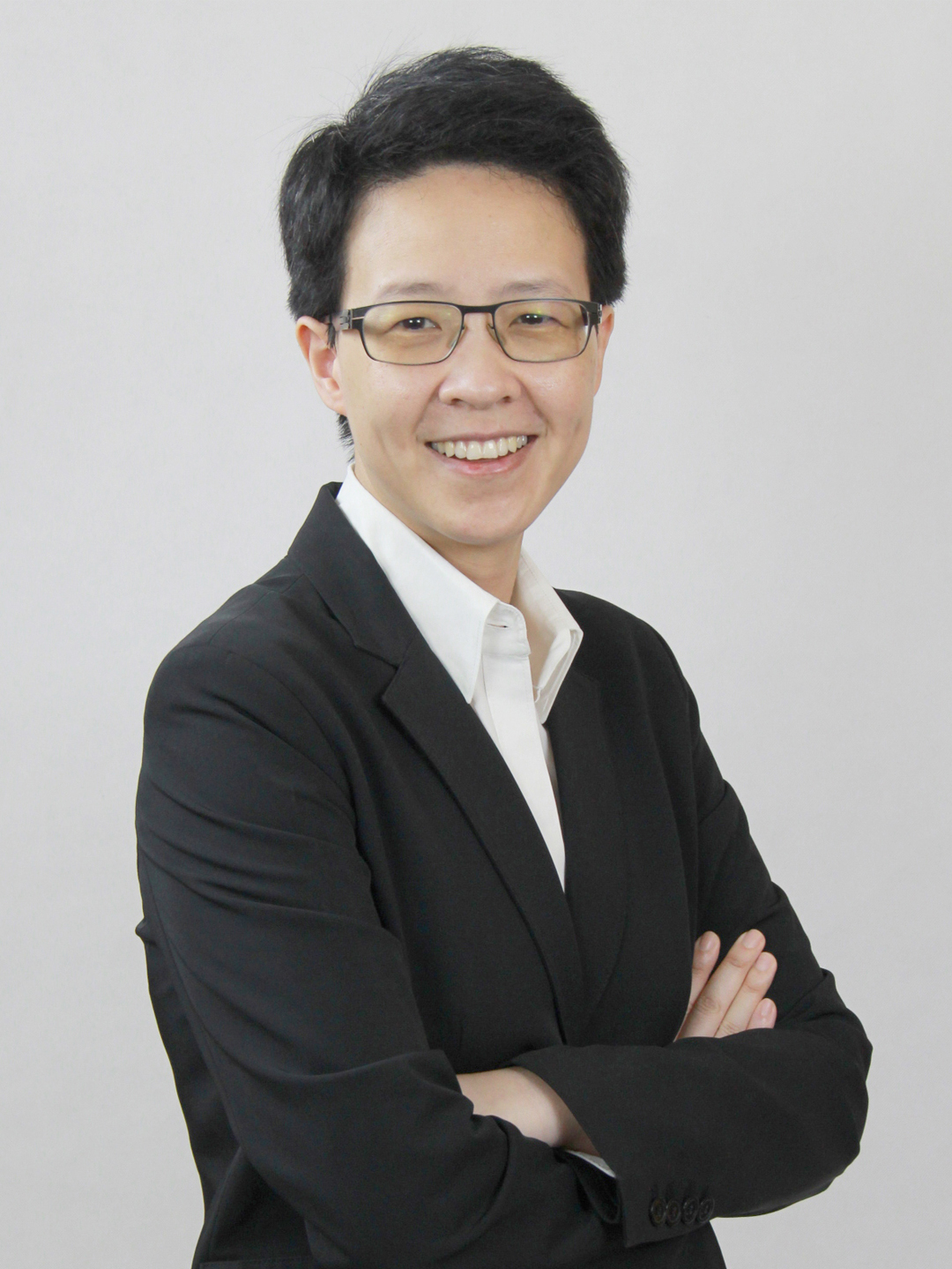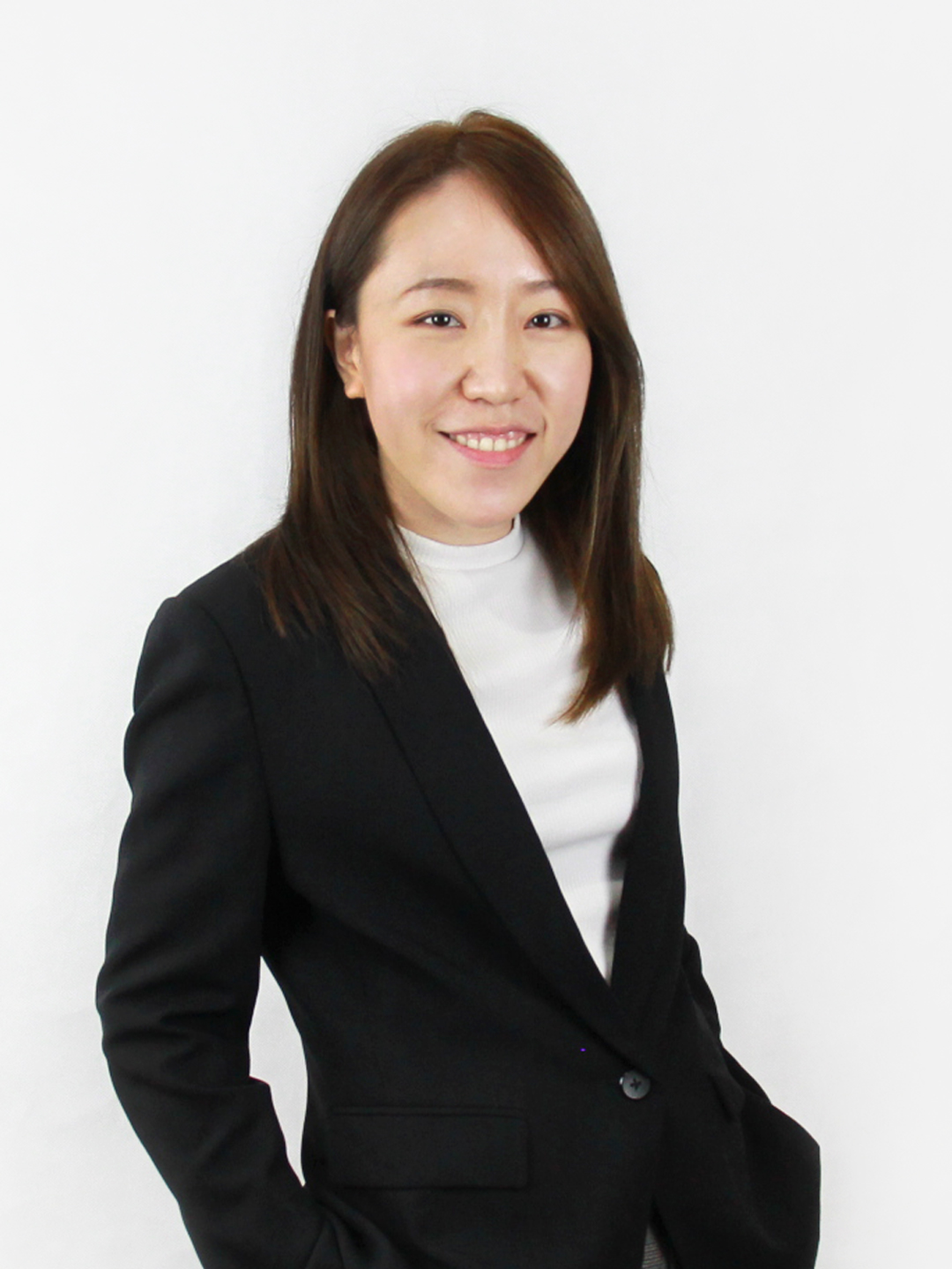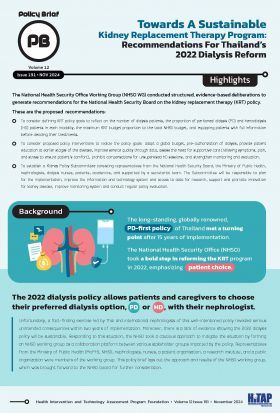This website uses cookies so that we can provide you with the best user experience possible. Cookie information is stored in your browser and performs functions such as recognising you when you return to our website and helping our team to understand which sections of the website you find most interesting and useful.
Kidney Replacement Therapy Policy of Universal Care Scheme in Thailand: Lessons Learned and The Way Forward
Project Code
67083002RM008L0
Research team
Researchers
Prof. Emeritus Kriang Tungsanga
Prof. Vivekanand Jha
Co - Researcher
Dr. Jadej Tammatacharee
Dr. Suwit Wibulpolprasert
Dr. Somsak Chunharas
Vuddhidej Ophascharoensuk, M.D
Dr. Piyathida Chuengsaman
Dr. Talernsak Kanjanabuch
Dr. Kearkiat Praditpornsilpa
Dr. Valerie Luyckx
Dr. Gloria Ashuntantang
Dr. Fatiu Arogundade
Dr. Sydney Tang
Dr. Laura Sola
Jeerath Phannajit, M.D
Natcha Yongphiphatwong
Dr. Wirun Limsawart
Jutamas Piyawong
Suphichcha Thitjuea
Project Details
Start: - June 2023
End: - December 2024
Project Status
Conducting Research - 65%
Viewer: 2586
Publish date3 August 2023 02:29
Project Summary
Kidney failure (KF)[1] is a life-threatening disease that requires either kidney transplantation or dialysis for survival (1, 2). As of 2019, it was estimated that globally, 1.4 million deaths occurred on account of chronic kidney disease (CKD) (3). The cost of treatment for KF is also high, leading to catastrophic household expenditure to households. Given the nature of the disease and the lack of affordability for households (4), it has been argued that countries might not achieve Universal Health Coverage (UHC), one of the Sustainable Development Goals (SDGs), without support for treating KF.
Thailand adopted UHC in 2002 when it introduced the Universal Coverage Scheme (UCS), covering more than 70% of the Thai population that was not enrolled in the Civil Servant Medical Benefit Scheme (CSMBS), for civil servants, and the Social Security Scheme (SSS), for non-government private sector employees (5). At this time, Thailand was one of a few lower-middle-income countries that introduced UHC, even as it was recovering from the 1997 financial crisis (6). However, treatment for KF was not included in the benefits package for UCS as there were concerns about the financial sustainability of this program should it be included. There were equity concerns as since 1998, Thailand had been fully reimbursing hemodialysis (HD) and peritoneal dialysis (PD) for ESRD patients covered by the CSMBS and SSS (7). This meant that only beneficiaries of the UCS, who were not covered by either the CSMBS or SSS, had to shoulder the cost of their life-saving treatment on their own (8, 9). In addition, most UCS beneficiaries came from lower-income groups with a relatively high prevalence of KF patients (10).
In response to growing pressure to include kidney replacement therapy (KRT) by multiple stakeholders, including professional organizations, non-profit organizations, researchers, patient groups, and dialysis providers, the government commissioned research to identify potential policy options (5). This included conducting a cost-effectiveness analysis of KRT and understanding the out-of-pocket costs for households, among others (11, 12). This advocacy process was the first in Thailand that used considerable evidence for the Universal Care Benefit Package (UCBP), the benefits package in the UCS scheme. In 2008, these efforts came to fruition by including the 'PD first' policy in the UCBP (10, 13). It allows patients eligible for PD to choose between PD or HD, with consequences of fully self-fund for choosing the latter (7). As for patients that are unsuitable for PD treatment, they can access HD without having to pay out-of-pocket expenses (7).
Thailand adopted multiple strategies that led to a successful implementation the ‘PD first’ policy, including incentives for patients and providers, bulk procurement of PD solutions, collaboration with training centers, health professionals associations, and non-profit organizations to improve the capacity of healthcare workers, increase the number of PD centers, and encourage PD centers to create local kidney patient clubs (5). The PD-first policy has had massive success with rapidly improved access to dialysis (14), better patient outcomes (14, 15) and is widely recognized (7, 13). Other low- and middle-income countries (LMICs), such as Indonesia and the Philippines, have also studied the cost-effectiveness of providing KRT, and countries such as India and Kenya have sought to learn from Thailand’s experience of implementing its dialysis policy (16, 17).
The policy remained in implementation for about 15 years until 2022, when a ‘free choice’ dialysis policy was introduced (18). The ‘free choice dialysis' policy allows PD and HD to be reimbursed for eligible patients, accommodating individual’s preference of dialysis (18). This policy grants patients greater flexibility to choose their dialysis treatments; however, it might pose an additional THB 28,000 or USD 811[2] per patient per year to the patients who select HD over PD due to more frequent hospital visits (5). The policy has the potential to impose a higher burden on the system, considering the higher cost of HD compared to PD, although, the extent of the impact should be assessed further.
Given Thailand’s experience in developing and implementing dialysis policies in a budgetary constraint setting, this study hopes to understand the evolution of the processes and highlight learnings that may be relevant for LMICs. This study will invite Thai UCS implementing agencies and international groups of scholars to draw lessons on why and how Thailand decided to adopt the PD first policy, how it was sustained for fifteen years, and the potential impacts of the new policy. This study would be relevant to Thai and international contexts, especially LMICs struggling to fund dialysis, an expensive, recurring, life-saving treatment (19).
We have a learning committee comprised of Thai and international experts who are involved in this study:
Co-chairs:
- Kriang Tungsanga
- Vivekanand Jha
Committee members:
- Vuddhidej Ophascharoensuk
- Jadej Tammatacharee
- Suwit Wibulpolprasert
- Somsak Chunharas
- Piyathida Chuengsaman
- Talernsak Kanjanabuch
- Kearkiat Praditpornsilpa
- Valerie Luyckx
- Gloria Ashuntantang
- Fatiu Arogundade
- Sydney Tang
- Laura Sola
Secretariat:
- Yot Teerawattananon
- Saudamini Dabak
- Kinanti Khansa Chavarina
- Jiratorn Sutawong
- Jeerath Phannajit
- Chulathip Boonma
Research team:
- Yot Teerawattananon
- Saudamini Dabak
- Kinanti Khansa Chavarina
- Jiratorn Sutawong
- Jeerath Phannajit
- Chulathip Boonma
- Tanainan Chuanchaiyakul
- Wirun Limsawart
- Jutamas Piyawong
- Supichcha Thitjuea
References
- Levey AS, Eckardt KU, Dorman NM, Christiansen SL, Cheung M, Jadoul M, et al. Nomenclature for Kidney Function and Disease: Executive Summary and Glossary from a Kidney Disease: Improving Global Outcomes (KDIGO) Consensus Conference. Kidney Dis (Basel). 2020;6(5):309-17.
- Wong CKH, Chen J, Fung SKS, Mok M, Cheng YL, Kong I, et al. Lifetime cost-effectiveness analysis of first-line dialysis modalities for patients with end-stage renal disease under peritoneal dialysis first policy. BMC Nephrol. 2020;21(1):42.
- Global Burden of Disease (GBD) 2019 [Internet]. 2019 [cited 19 June 2023]. Available from: http://www.healthdata.org/gbd/2019.
- Dodd R, Palagyi A, Guild L, Jha V, Jan S. The impact of out-of-pocket costs on treatment commencement and adherence in chronic kidney disease: a systematic review. Health Policy Plan. 2018;33(9):1047-54.
- Chuengsaman P, Kasemsup V. PD First Policy: Thailand's Response to the Challenge of Meeting the Needs of Patients With End-Stage Renal Disease. Semin Nephrol. 2017;37(3):287-95.
- Sumriddetchkajorn K, Shimazaki K, Ono T, Kusaba T, Sato K, Kobayashi N. Universal health coverage and primary care, Thailand. Bull World Health Organ. 2019;97(6):415-22.
- Kanjanabuch T, Takkavatakarn K. Global Dialysis Perspective: Thailand. Kidney360. 2020;1(7):671-5.
- Teerawattananon Y, Tangcharoensathien V. Designing a reproductive health services package in the universal health insurance scheme in Thailand: match and mismatch of need, demand and supply. Health Policy Plan. 2004;19 Suppl 1:i31-i9.
- Treerutkuarkul A. Thailand: health care for all, at a price. Bull World Health Organ. 2010;88(2):84-5.
- Tantivess S, Werayingyong P, Chuengsaman P, Teerawattananon Y. Universal coverage of renal dialysis in Thailand: promise, progress, and prospects. BMJ. 2013;346:f462.
- Prakongsai P, Palmer N, Uay-Trakul P, Tangcharoensathien V, Mills A. The Implications of Benefit Package Design: The Impact on Poor Thai Households of Excluding Renal Replacement Therapy. Journal of International Development, Forthcoming. 2009.
- Teerawattananon Y, Mugford M, Tangcharoensathien V. Economic evaluation of palliative management versus peritoneal dialysis and hemodialysis for end-stage renal disease: evidence for coverage decisions in Thailand. Value Health. 2007;10(1):61-72.
- Liu FX, Gao X, Inglese G, Chuengsaman P, Pecoits-Filho R, Yu A. A Global Overview of the Impact of Peritoneal Dialysis First or Favored Policies: An Opinion. Perit Dial Int. 2015;35(4):406-20.
- Kanjanabuch T, Puapatanakul P, Halue G, Lorvinitnun P, Tangjittrong K, Pongpirul K, et al. Implementation of PDOPPS in a middle-income country: Early lessons from Thailand. Perit Dial Int. 2022;42(1):83-91.
- Dhanakijcharoen P, Sirivongs D, Aruyapitipan S, Chuengsaman P, A L. The "PD First" policy in Thailand: three-years experiences (2008-2011). J Med Assoc Thai. 2011;94:S153-61.
- Afiatin, Khoe LC, Kristin E, Masytoh LS, Herlinawaty E, Werayingyong P, et al. Economic evaluation of policy options for dialysis in end-stage renal disease patients under the universal health coverage in Indonesia. PLoS One. 2017;12(5):e0177436.
- Bayani DBS, Almirol BJQ, Uy GDC, Taneo MJS, Danguilan RS, Arakama MI, et al. Filtering for the best policy: An economic evaluation of policy options for kidney replacement coverage in the Philippines. Nephrology (Carlton). 2021;26(2):170-7.
- National Health Security Office. ตั้งแต่ 1 ก.พ.นี้ ผู้ป่วยไตวายเรื้อรังสิทธิบัตรทองตัดสินใจร่วมกับแพทย์เพื่อเลือกวิธีฟอกไตที่เหมาะสมได้. 2022 [Available from: https://www.nhso.go.th/news/3471.
- Mushi L, Marschall P, Flessa S. The cost of dialysis in low and middle-income countries: a systematic review. BMC Health Serv Res. 2015;15:506.
[1] The term ‘kidney failure’ is used to substitute ‘end-stage kidney disease’ or ‘end-stage renal disease’ as recommended by the Kidney Disease: Improving Global Outcomes (KDIGO) Consensus Conference (1)
[2] 1 USD is equivalent to THB 35











 Policy Brief Issue 191: Towards A Sustainable Kidney Replacement Therapy Program: Recommendations For Thailand’s 2022 Dialysis Reform
Policy Brief Issue 191: Towards A Sustainable Kidney Replacement Therapy Program: Recommendations For Thailand’s 2022 Dialysis Reform
